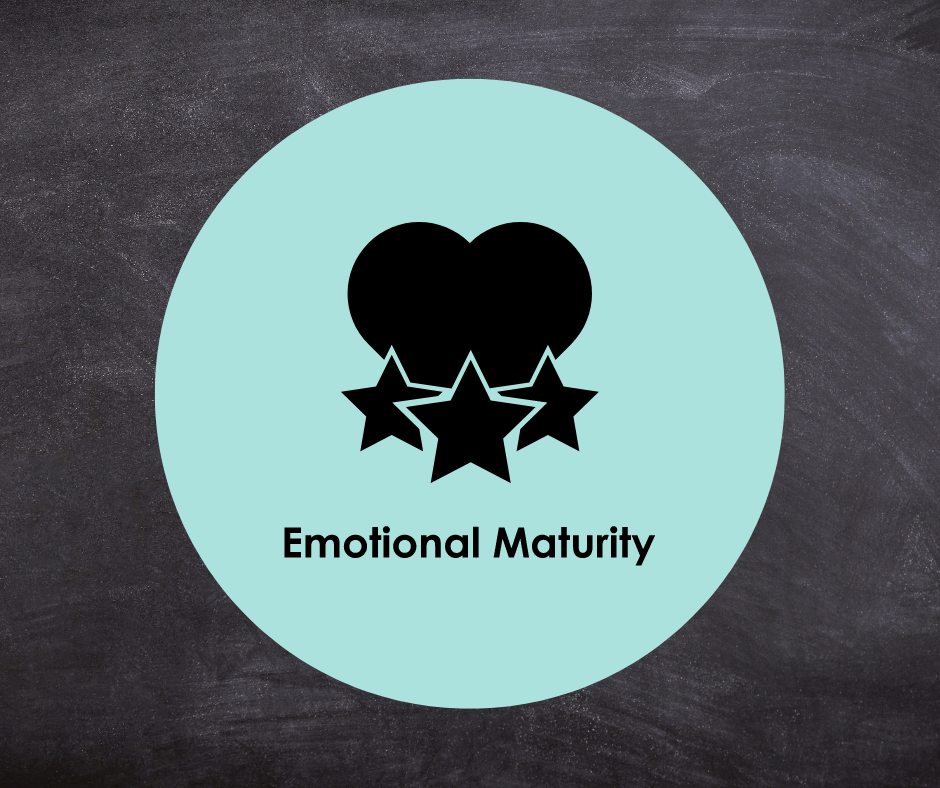It is no secret that we live in an age of unparalleled emotional turbulence. Everywhere we look, there seems to be evidence of increasing anxiety, depression, and stress levels. But unfortunately, the cause of this epidemic is not a lack of understanding or awareness on the part of the general population; it is our ignorance about the root cause of our emotional problems. And that root cause can be summed up in one word: maturity.
Mature individuals have a clear understanding of their own emotions and the emotions of others. They know how to handle difficult situations without resorting to childish behaviors like tantrums or withdrawal. They can regulate their emotions effectively, respond appropriately to challenging circumstances, and maintain healthy relationships with the people around them. In short, they possess what could be called emotional intelligence (EI).
Understanding Emotional Maturity
To understand the role of emotional maturity, I think it’s essential to have an in-depth understanding of it. As they say, you can’t speculate about running when you can’t even crawl. So, what does it mean to be emotionally mature?
The first step in emotional maturity is understanding that your emotions are yours. This may sound like a no-brainer, but you would be surprised how many people do not have this essential awareness. Instead, they allow their emotions to be dictated by the people and circumstances around them instead of taking responsibility for their inner state.
Awareness is the key thing here.
To be emotionally mature means to be aware of your emotions as they are happening, without judgment or attachment. It means observing your thoughts and feelings without getting wrapped up in them or identifying with them as if they were who you are. This can be difficult for many people because our emotions can be potent and persuasive. But it is essential for emotional maturity.
Where does emotion regulation come in?
Emotional maturity has to do with the ability to regulate your emotions. This means being able to control your reactions to the events happening in your life instead of letting your emotions control you. It also means effectively managing stress and other challenging emotions without resorting to unhealthy coping mechanisms like substance abuse, binge eating, or self-harm.
Many people struggle with regulation because they don’t know how to deal with their emotions healthily. So, they either stuff them down and pretend they don’t exist (ignorance) or let them out uncontrolled and destructively. But emotional maturity requires that we find a middle ground. In general, I mean you need to learn how to express your emotions healthily and constructively.
The Benefits of Emotional Maturity
It should be clear by now that emotional maturity is not simply a matter of being able to keep your cool under pressure. It is a much more complex and nuanced concept than that. And it comes with a whole host of benefits, both for the individual and for society as a whole.
Some of the benefits of emotional maturity include:
You Experience Improved Mental Health
This is when we can cope with stress and difficult emotions healthily instead of letting them spiral out of control. As a result, we are also less likely to develop mental health problems like anxiety and depression. Is that not a good thing?
Greater Life Satisfaction
Emotionally mature people tend to be more satisfied with their lives. This is because they have healthier relationships with themselves and God, better jobs, and more fulfilling hobbies and interests. Personally, I’m more resilient when faced with adversity, and some contentment comes with such a feeling.
Happiness

This might seem petty, but we all know that happy people are more successful than unhappy people. Why? Because happiness leads to a more positive outlook on life, leading to better decision-making, increased productivity, and improved physical health. Happiness is a pillar of all the above-listed benefits.
Higher Levels of Success
Who doesn’t love to make it in life? Absolutely no one. Many successful people have one thing in common: emotional maturity. This is because if you’re emotionally mature, you can set goals and achieve them, despite challenges and setbacks. You also get to maintain positive relationships with the people around you, which is essential for personal and professional success.
A more fulfilling life
Last but not least, emotional maturity leads to a more fulfilling life. This is one thing that we all seek in life, fulfillment. When you’re emotionally mature, you can find meaning and purpose in your life. You also enjoy the moment and appreciate the simple things in life.
The Paradox of Ignorance on Emotional Intelligence
There’s a famous saying that goes, “ignorance is bliss.” And in many ways, this is true. Ignorance can lead to happiness because it means you’re unaware of the negative things in your life. However, regarding emotional intelligence, ignorance is not bliss.

One of the biggest problems with emotional intelligence is that many people are simply ignorant of its existence. They don’t know what it is or why it’s crucial. And as a result, they go through life without developing this essential skill.
The good news is that emotional intelligence is something that anyone can learn and improve upon. It just takes a little bit of effort and commitment. But the rewards are more than worth it.
Psychological Meaning of Ignorance
I like to take things sincerely, and this part is one of those things. Ignorance has a psychological meaning too, which is quite interesting.
According to psychologists, ignorance is a defense mechanism. It’s a way of protecting yourself from the pain and suffering that comes with knowledge. But in the same way, we have seen that ignorance contributes highly to emotional problems; it also has cons.
But typically, ignorance can either be intentional or unintentional.
Intentional Ignorance
This is when you choose to be ignorant about something because you know that knowledge will bring you pain. For example, let’s say you’re in a relationship with someone abusive. You might choose to ignore the signs of abuse because you don’t want to face the reality that your partner is capable of hurting you.
Unintentional Ignorance
This is when you’re ignorant about something because you don’t know any better. For example, let’s say you grew up in a family where emotional maturity was never taught or valued. As a result, you might be unaware of its importance and how it can improve your life.
So, what is the implication of such ignorance in our lives?
There are a few implications of ignorance, especially regarding emotional intelligence.
For one, ignorant people are more likely to make impulsive decisions. This is because they’re not taking the time to think things through and consider all the possible outcomes. As a result, they often end up in situations that are far from ideal.
Secondly, ignorant people are more likely to be controlled by their emotions. Typically, they don’t know how to manage and regulate their emotions effectively. As a result, they often let their emotions dictate their actions and decisions, leading to problems in their personal and professional lives.
Lastly, ignorant people are more likely to have difficulty forming and maintaining relationships. This is because they don’t know how to communicate and connect with others effectively. The result of this is a feeling of isolation and loneliness.
How Do You Get Rid of Your’ Ignorance Is Bliss’ Mindset?
We all have a little voice that tells us things like “you’re not good enough” or “you can’t do that.” Unfortunately, for some people, this voice is louder and more persistent than for others. So, if you’re constantly second-guessing yourself or putting yourself down, it’s time to get rid of your “ignorance is bliss” mindset.
Emotional maturity is key to getting rid of your self-doubt. First, you must recognize your emotions and understand how they impact your thoughts and behavior. Once you handle your feelings, you can start challenging the negative thoughts holding you back.
One way to do this is to reframe your thinking. For example, instead of telling yourself, “I can’t do that,” try saying, “I’m not sure how to do that yet, but I’m willing to learn.” Then, when you see yourself as a student instead of a failure, you open yourself up to new possibilities and growth.
It’s also essential to build a support network of friends, family, or colleagues who believe in you and your abilities. These people can provide encouragement and positive reinforcement when you’re feeling down about yourself. Additionally, they can help you step outside of your comfort zone and try new things.
Finally, don’t be afraid to celebrate your accomplishments, big or small. Taking the time to acknowledge your successes helps increase your self-confidence and belief in your ability to achieve your goals.
Does Age Have Anything to Do with Emotional Maturity

I will answer this from a personal perspective. I have a friend with whom we once discussed how teenagers transform and shun their odd behavior as they grow. And somewhere within the conversation, she mentioned that maturity comes with age. And for a minute on this topic, I thought about it.
I would gladly say that age has something to do with emotional maturity. The emotional maturity of an individual is not solely based on the number of years they have been alive, but it is partially based on age. As a person matures emotionally, they gain a better understanding of self and others, develop improved emotional control, and hone skills in empathy and compassion. As a result, an emotionally mature individual can effectively manage their own emotions and respond constructively to the feelings of others.
While emotional maturity is not entirely determined by age, it is undoubtedly influenced by it. With each passing year, we have the opportunity to grow and develop emotionally if we choose to do so. As we age, we gain more significant insights into ourselves and the world around us. We learn from our mistakes and become better equipped to handle relationships healthily and maturely. While emotional maturity does not necessarily come with age, it is more likely to develop as we age.
Traits of an Emotionally Mature Person
Several traits are indicative of an emotionally mature person. Here are some signs of emotional maturity:
- Humility
Even in the Bible, Jesus said that He, the greatest among us, must be a servant. This is the attitude of an emotionally mature person. They do not need to put on a false front or try to make themselves look good to be accepted. An emotionally mature person understands the power of humility, is secure in who they are, and does not feel the need to prove themselves to others.
- Flexibility
An emotionally mature person is flexible and adaptable. They realize that life is constantly changing and that they need to change with it. They are open to new ideas and willing to let go of old ways of thinking that no longer serve them.
- Patience
An emotionally mature person understands that good thing come to those who wait. So, they are patient with others, knowing that rushing things will only lead to frustration.
- Empathy
If you’re emotionally mature, you can put yourself in another person’s shoes and understand their perspective. As a result, you get to be compassionate and non-judgmental, seeing the best in others even when they make mistakes.
- Self-awareness
An emotionally mature person is aware of their own emotions and how they affect others. As a result, they can take responsibility for their feelings and behaviors and not try to control or manipulate others. They are self-aware of their deeds.
Assertiveness is also a virtue. If one is emotionally mature, one can express their needs and wants without being aggressive or disrespectful. They know how to set boundaries and stand up for themselves healthily.
What will it be?
So, I’ll leave you to digest that for today. And I believe these personal traits and age have something to do with emotional maturity.
What are your thoughts? Do you agree that our ignorance drains us into emotional problems?









Comments & Discussion
0 COMMENTS
Please login to read members' comments and participate in the discussion.